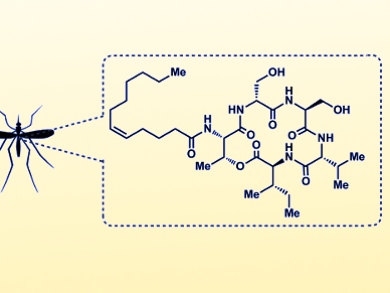Research on the microbiomes of insects, i.e., the microorganisms living within insects, has led to the discoveries of new natural products with interesting bioactivities and potential implications for ecology. Jon Clardy, Harvard Medical School, Boston, MA, USA, Emily R. Derbyshire, Duke University, Durham, NC, USA, and colleagues have explored the microbiome of the Anopheles mosquito. Anopheles mosquitoes transmit the Plasmodium parasite, the infectious agent that causes malaria. The microbiome can influence the Plasmodium parasite by mechanisms that are not yet fully understood.
The team analyzed the midgut and salivary glands of the mosquitoes using gene sequencing and found Serratia bacteria. They are known as natural product producers. The team used mass spectrometry (MS) to analyze extracts of Serratia cultures and discovered a range of novel lipodepsipeptides in the bacteria’s metabolites (example pictured). These compounds are named stephensiolides A–K after the Anopheles stephensi mosquitoes from which the bacteria were isolated.
The discovered peptides have antimicrobial activity against gram-positive bacteria and blood-stage malaria parasites. According to the researchers, this could explain the overwhelming presence of Gram‐negative bacteria over Gram‐positive bacteria within A. stephensi. The peptides also improve the bacteria’s mobility, which might strengthen the bacteria’s ability to populate Anopheles mosquitoes. The results encourage future efforts towards understanding and exploiting the chemical ecology of mosquitoes to control diseases.
- Discovery of Antimicrobial Lipodepsipeptides Produced by a Serratia sp. within Mosquito Microbiomes,
Jack G. Ganley, Gavin Carr, Thomas R. Ioerger, James C. Sacchettini, Jon Clardy, Emily R. Derbyshire,
ChemBioChem 2018.
https://doi.org/10.1002/cbic.201800124




